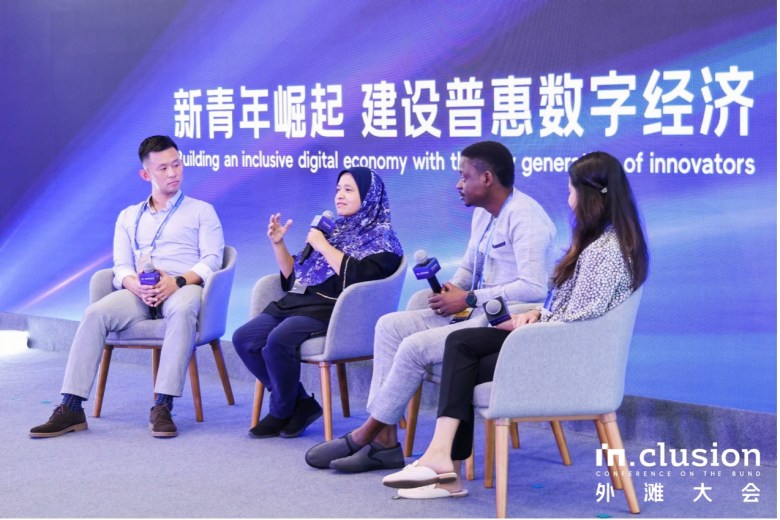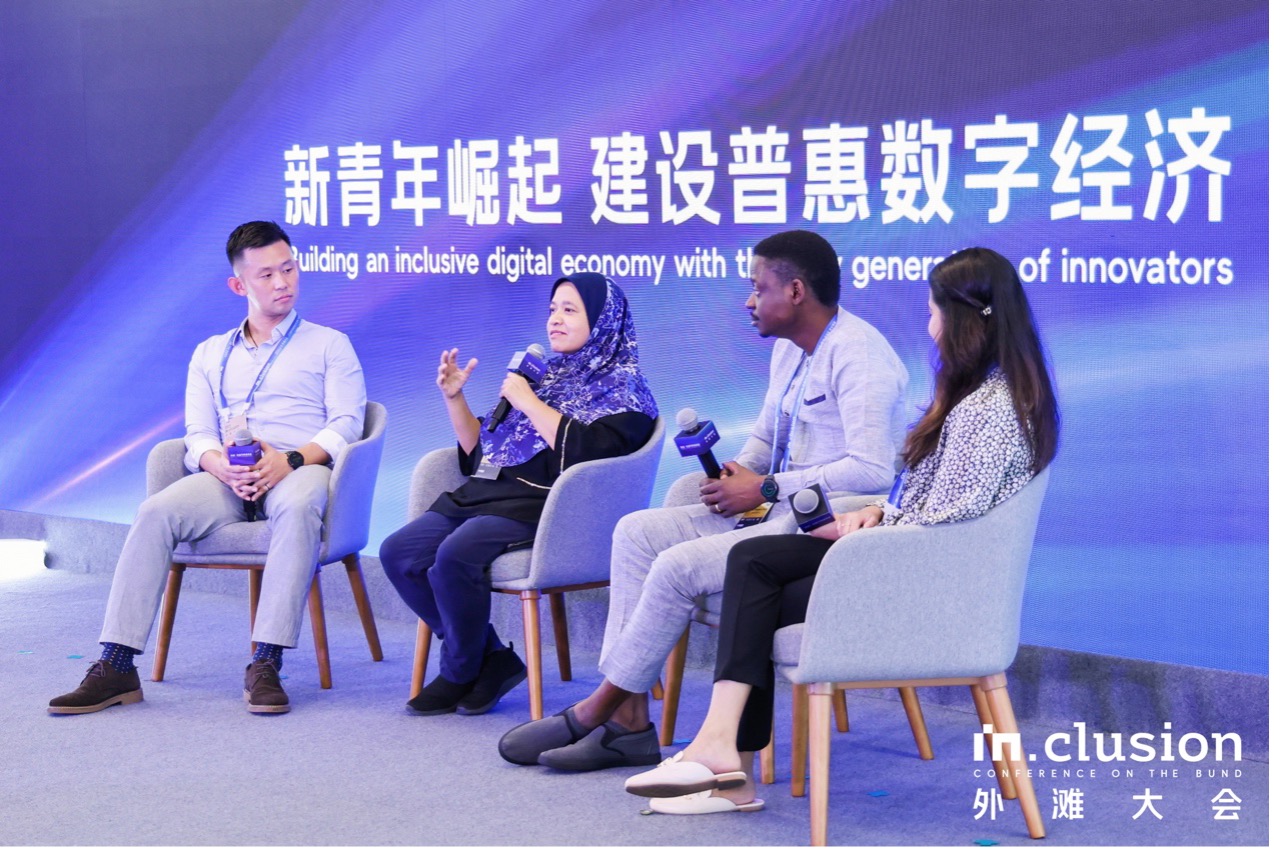With the theme of “Technology for a Sustainable Future,” the INCLUSION Conference on the Bund was held in Shanghai from September 7 to 9, bringing together global experts, scholars, and entrepreneurs to explore technological developments in economic industries.
On September 8, one of the events organizing committee members, Ant Group invited three overseas guests from the 10×1000 Tech for Inclusion program to the C3 Forum to share their views on the theme, “Building an inclusive digital economy with the new generation of innovators”: Nuraizah Shamsul Baharin (managing director of MADcash in Malaysia), Anbar Nawar (product manager at bKash in Bangladesh), and Opeyemi Praise (senior product manager at Sterling Bank in Nigeria).
Underserved communities often face unique challenges when accessing and harnessing digital technologies. However, opportunities can emerge from developing the digital economy in these communities. The three guests individually presented insights into their local markets and the varied challenges involved in developing the digital economy.

10×1000 Tech for Inclusion Program Initiated by Ant Group and IFC
Before the panel discussion, the host briefly introduced the 10×1000 Tech for Inclusion Program, an initiative aimed at promoting tech inclusion and bridging the digital divide in underserved communities.
The program focuses on providing support and resources to empower individuals and communities to fully participate in the digital economy. Its mission is to nurture and inspire at least 1,000 emerging talents and tech leaders each year for the next ten years. Currently, the program connects more than 5,000 individual talents in the global digital community, representing 96 countries and regions.
Empowering women to build their own businesses in Malaysia
Fintech, short for financial technology, refers to the use of technology and innovation to provide financial services and solutions. It encompasses a broad spectrum of digital tools, applications, and platforms designed to enhance and streamline various aspects of financial activities, including banking, payments, investments, lending, and insurance.
MADCash in Malaysia is a financial service provider that offers a range of cash loan options to individuals in Malaysia, with a particular focus on underprivileged groups including women with limited educational backgrounds. MADCash offers personal loans with flexible repayment options, aiming to provide a hassle-free loan application process with minimal documentation requirements and fast approval times.
MADCash stands for “multiply, assist, donate cash”, Nuraizah Shamsul Baharin, the managing director of MADCash explained at the panel. “We provide small funds for female entrepreneurs in our country who do not have access to credit. They cannot get loans since they are high risks for traditional banks, but we can help them build their small business,” she said.
In many developed countries and regions, resources related to education and employment are not equally accessible to women. Therefore, women face more obstacles in building their own startups, as most traditional banks often decline their loans for investments, due to factors such as credit history, educational background, and employment experiences. MADCash looks to offer one model for bypassing these traditional barriers.
Fostering trust in the digital economy for local customers in Bangladesh
bKash is a mobile financial service in Bangladesh, offering a diverse range of financial services, including money transfers, bill payments, mobile top-ups, and more, through a mobile app or USSD code. bKash has played a significant role in promoting financial inclusion in Bangladesh, especially among the unbanked population. One of the key advantages of bKash is its convenience. Users can easily send and receive money, pay bills, and make purchases using their mobile phones, without the need for a traditional bank account.
However, a key challenge lies in ensuring trust and security in digital technology. Like any digital financial service, there is always a risk of fraud and unauthorized access to personal information. It is crucial for both bKash and its users to prioritize security measures and educate customers about safe usage practices.
“First of all, what we really struggle with is the dependency on cash. There is a huge difference between cities and semi-urban or rural areas,” Anbar Nawar, product manager at bKash, explained “People don’t have access to a lot of technological knowledge, so they are more prone to using cash, even if we provide them with enough awareness about our apps, and our services. No matter how easy that is, they feel more comfortable with cash.”
In addition to trust issues, Anbar also elaborated on other challenges, including employment difficulties for technological talents in Bangladesh, huge differences between urban and rural areas, and the need for financial-related education for local people.
Emerging markets and opportunities in Nigeria
Sterling Bank is a leading financial institution in Nigeria, offering a wide range of financial services to individuals, businesses, and institutions. It provides various financial services, including personal banking, corporate banking, asset management, treasury services, and electronic banking solutions.
Similar to many banks in Nigeria, Sterling Bank has embraced digital banking to provide its customers with convenient and efficient banking services. This consists of internet banking, mobile banking, and other digital channels for transactions and account management.
“Last year, the total electronic transactions reached $1.7 trillion in Nigeria. It is projected to grow by 30% this year, at least, Opeyemi Praise, senior product manager at Sterling Bank, told the conference. “The internet penetration is 95% in our country. The challenge is that we need to advocate for overseas investors to localize their digital products for the local market.”
Another key challenge that Praise mentioned was the need for educational training in financial and technological fields for the younger generations in Nigeria. Young people under the age of 30 comprise more than 70 percent of Nigeria’s population, he added, indicating enormous potential in the digital economy for this African country.
This article was supported by Ant Group. We believe in transparency in our publishing and monetization model. Read more here.

